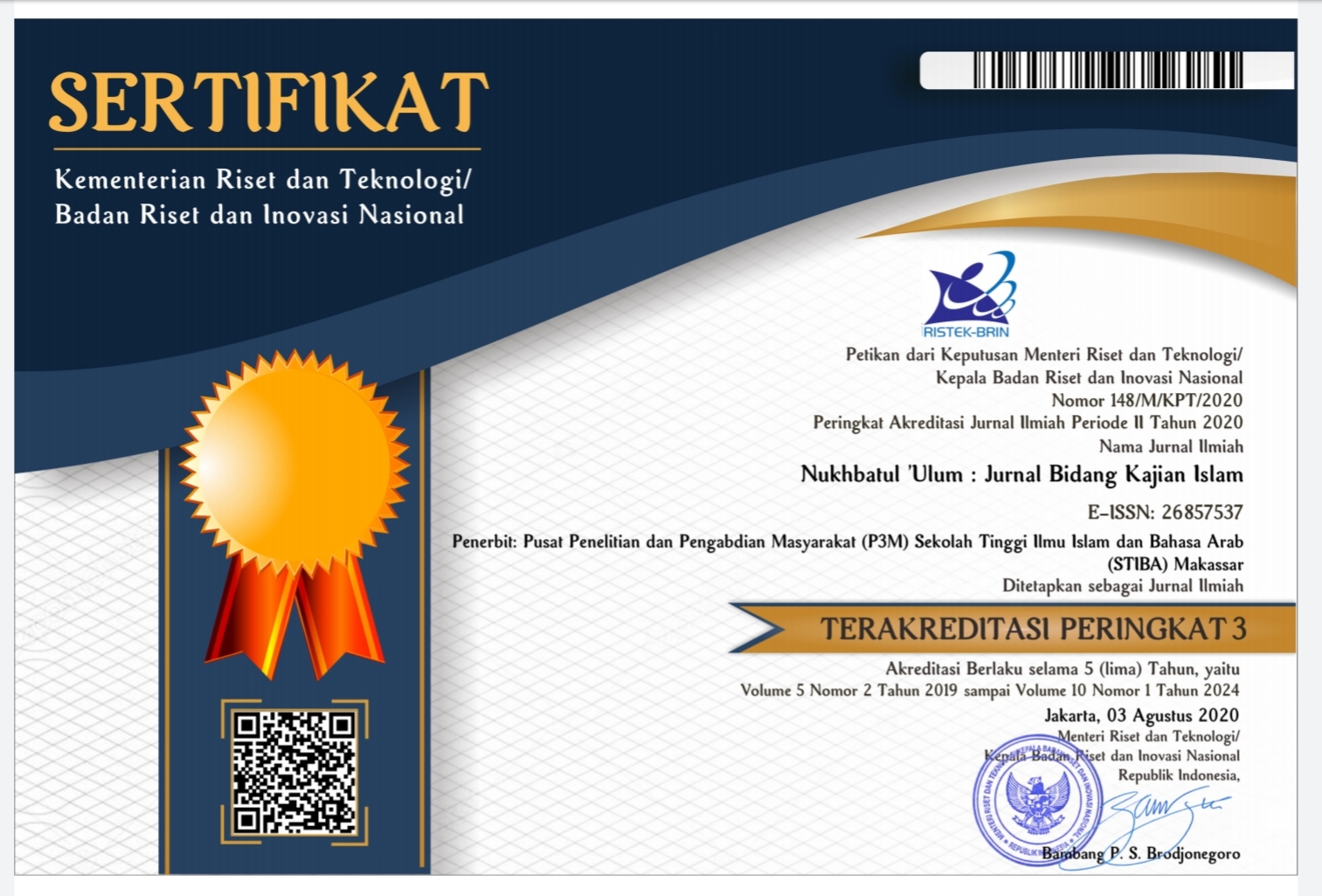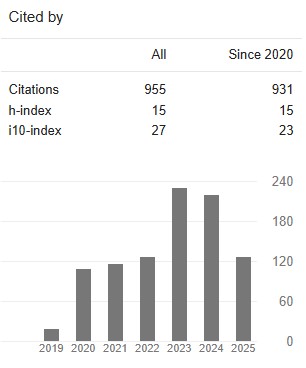Selling Item that Have Not Been Paid in the Perspective of Mazhab of Syāfi‘iyyah and Ḥanābilah
DOI:
https://doi.org/10.36701/nukhbah.v10i1.1418Keywords:
buying and selling, credit, unpaid, Syāfi‘iyyah, ḤanābilahAbstract
This research aims to determine the views of the Syāfi'iyyah and Ḥanābilah schools of thought regarding the status or validity of goods purchased on credit and the law of selling goods that have not been paid in full. This research is descriptive-qualitative (non-statistical) research, with the type of library research using normative and juridical-normative approaches. The results of the research show that the ownership status of goods that have not been paid for has been transferred (ownership) from the seller to the buyer, as indicated by the existence of a contract and the handover of both. This is part of the opinion of the Syāfi'iyyah and Ḥanābilah schools of thought. Selling goods that have not been paid off to the owner of the goods (lender), or what is known as 'īnah buying and selling, or to a third party (other than the first seller), is permissible in the view of the Syāfi'iyyah school of thought, provided that the buyer has received the object of the sale and purchase before he makes the next transaction. Meanwhile, in the view of the Ḥanābilah school of thought, selling goods that have not been paid for is permissible, but only if the purpose of purchasing the goods is to be used or traded properly, provided that the buyer has received the object of the sale and purchase before he carries out the next transaction.
Downloads
References
‘Abd al-‘Azīz ibn ‘Abdillāh ibn Bāz. Fatāwā Nūr ‘Alā Al-Darb, n.d.
Abū Muḥammad ‘Abdillah ibn Aḥmad ibn Muḥammad ibn Qudāmah. Al-Kāfī Fī Fiqh Al-Imām Aḥmad. Cet. I. Dār al-Kutub al-‘Ilmiyyah, 1994.
Abū Muḥammad ‘Abdillāh ibn Aḥmad ibn Muḥammad ibn Qudāmah. Al-Mugnī. Cet. I. Kairo: Maktabah al-Qāhirah, 1968.
Al-Bahūtī, Manṣūr ibn Yūnus. Kasysyāf Al-Qinā‘ ‘an Al-Iqnā‘. Cet. I. Wizārah al-‘Adl, 2000.
al-Bukhārī, Abū Abdillāh Muḥammad ibn Ismā’īl ibn Ibrāhīm ibn al-Mugīrah. Ṣahīḥ Al-Bukhārī. Cet. I. Beirūt: Dār Ṭūq al-Najāh, 2001.
Al-Ḥarrānī, ‘Abd al-Salām ibn ‘Abdillāh al-Khuḍr ibn Muḥammad ibn Taimiyyah. Al-Muḥarrar Fī Al-Figh `alā Mażhab Aḥmad. Maṭba`ah al-Sunnah al-Muḥammadiyyah, 1941.
Al-Ḥarrānī, Taqiy al-Dīn Abū al-‘Abbās Aḥmad ibn ‘Abd al-Ḥalīm ibn Taimiyyah. Majmū’ Al-Fatāwā. al-Madīnah al-Munawwarah: Mujma’ al-Malik Fahd, 2005.
Al-Khin, Muṣṭafā, Muṣṭafā Al-Bugā, and Alī Al-Syarbajī. Al-Fiqh Al-Manhajī ‘Alā Mażhab Al-Imām Al-Syāfi’Ī. Cet. IV. Damaskus: Dār al-Qalam, 1992.
Al-Makkī, al-Syāfi’ī Abū ‘Abdillāh Muḥammad ibn Idrīs ibn al-‘Abbās ibn ‘Uṡmān ibn Syāfi’ ibn ‘Abd al-Muṭṭalib ibn ‘Abd Manāf al-Muṭṭalibī al-Qurasyī. Al-Umm. Beirūt: Dār al-Ma’rifah, 1990.
Al-Maqdisī, Ibnu Qudāmah. Al-Mughnī. Al-Qāhirah: Maktabah al-Qāhirah, 1986.
Al-Mardāwī, ‘Alā’ al-Dīn Abū al-Ḥasan ‘Alī ibn Sulaimān ibn Aḥmad. Al-Inṣāf Fī Ma‘rifah Al-Rājiḥ Min Khilāf. Cet. I. al-Qāhirah: Hijr li al-Ṭabā‘ah, 1995.
Al-Najjār, Taqiy al-Dīn Muḥammad ibn Aḥmad al-Fatūḥī ibn. Muntahī Al-Irādāt. Cet. I. Muassasah al-Risālah, 1999.
Al-Nawawī, Abū Zakariyyā Muḥyī al-Dīn Yaḥyā ibn Syaraf. Al-Majmū’ Syarḥ Al-Muhażżab. Dār al-Fikr, 2010.
Al-Nawawī, Yaḥyā ibn Syaraf Muḥyī al-Dīn al-Nawawī Abū Zakariyyā. Rauḍah Al-Ṭālibīn Wa `Umdah Al-Muftīn. III. Beirūt: al-Maktab al-Islāmī, 1991.
Al-Qazwīnī, ‘Abd al-Karīm ibn Muḥammad al-Rāfi‘ī. Fatḥ Al-‘Azīz Bi Syarḥ Al-Wajīz. Dār al-Fikr, 2010.
al-Sa‘dī, ‘Abd al-Raḥmān. Taysīr Al-Karīm Al-Raḥmān Fī Tafsīr Al-Kalām Al-Mannān. Riyadh, KSA: Dar al-Salam, 2002.
al-Syaibānī, Abū ‘Abdillah Aḥmad ibn Muḥammad ibn Ḥanbal ibn Hilāl ibn Asad. Musnad Al-Imām Aḥmad Ibn Ḥanbal. Cet. I. Beirūt: Muassah al-Risālah, 2001.
Al-Syīrāzī, Abū Isḥāq Ibrāhīm ibn ‘Alī ibn Yūsuf. Al-Mażhab Fī Fiqh Al-Imām Al-Syāfi‘Ī. Dār al-Kutub al-‘Ilmiyyah, 2010.
Kementerian Wakaf dan Urusan Islam Kuwait. Al-Mausū’ah Al-Fiqhiyyah Al-Kuwaitiyyah. II. Kuwait: Dār al-Salāsil, 1983.
Kementrian Agama. Al-Qur’an Hafalan Mudah Terjemahan Dan Tajwid Warna. Bandung: Cordoba, 2019.
Khaer, Misbakhul, and Ratna Nurhayati. “Jual Beli Taqsith (Kredit) Dalam Perspektif Hukum Ekonomi Islam.” Jurnal Hukum Islam Nusantara 2 (2019): 99–110.
Mahmuddin, Ronny. “Jual Beli Dua Harga Dalam Satu Transaksi Jual Beli (Studi Komparatif Antara Mażhab Mālikī Dan Mażhab Syāfi’ī).” Bidang Hukum Islam 2, no. 2 (2021).
Mainiyo, Attahir Shehu, and Muhammad Maga Sule. “Impact of Qur’anic Moral Excellence on the Lives of Muslim Society: An Exposition.” Demak Universal Journal of Islam and Sharia 1, no. 03 (2023): 188–205.
Mālik ibn, Anas. Al-Muwaṭṭa‘. Bairūt: Dār Iḥyā’ al-Turāṡ al-‘Arabī, n.d.
Muḥammad ibn Ṣāliḥ ibn Muḥammad al-‘Uṡaimīn. Al-Syarḥ Al-Mumti’ ‘Alā Zād Al-Mustaqni.’ Dār ibn al-Jauzī, 2001.
Mulyadi, Seto, A. M. Heru Basuki, and Hendro Prabowo. Metode Penelitian Kualitatif Dan Mixed Method. Cet. I. Depok: PT. RajaGrafindo Persada, 2019.
Nawawi. Metode Penelitian Fiqh Dan Ekonomi Syari’ah. Cet. I. Malang: Madani Media, 2019.
Tarmizi, Erwandi. Harta Haram Muamalat Kontemporer. Cet. XX. Bogor: P.T. Berkat Mulia Insani, 2018.
Wahyuni, Tri. “Analisis Hukum Terhadap Sistem Perkreditan Pada PT Colombus Pinrang.” Sekolah Tinggi Agama Islam Negeri (STAIN), 2018.
Wiratmini, Ni Putu Eka. “Mayoritas Wilayah Catatkan Pertumbuhan Kredit, Kecuali 3 Provinsi Ini.” Bisnis.Com, 2020.
Wulandari, Resa. “Tinjuan Hukum Islam Tentang Penjualan Barang Kredit (Studi Kasus Pada Warga Banjar Negeri Kecamatan Gunung Alip Kabupaten Tanggamus).” Universitas Islam Raden Intan Lampung, 2018.
Zainuddin, Masyuri dan Muhammad. Metodologi Penelitian. T. Cet. Bandung: Refika Aditama, 2008.
Ziaulhaq, Wahyu. “Buying and Selling Used Clothing: An Islamic Economy Law Perspective.” Journal of Nusantara Economy 1, no. 1 (2022): 29–37.


















